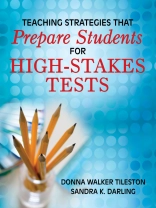‘Helps building and district-level administrators realize that they don′t have to abandon sound and effective instructional practices to prepare students for high-stakes tests.’
—Sheila Smith, Science Specialist
Jackson Public Schools, MS
‘I encourage trainers to discuss this text and its applications with teachers to enhance the performance of students on state and national tests. This book meets a very specific need in classrooms.’
—J-Petrina Mc Carty-Puhl, Teacher
Robert Mc Queen High School, Reno, NV
Improve student performance on high-stakes tests with research-proven practices for teaching to standards!
Standardized tests are one of the leading measures of student achievement and educator accountability today, so it is important to give students the necessary skills to perform well on state exams and to align instructional practices with standards. This step-by-step manual outlines a straightforward, powerful model for infusing state standards and knowledge benchmarks into lesson plans and day-to-day assessments to boost overall achievement.
Grounded in the results of more than 30, 000 studies, the best practices shared by the authors are linked specifically to the two types of knowledge—declarative and procedural—assessed on high-stakes tests and are ranked according to their effectiveness for each type. To help educators maximize testing results while meeting state standards and ultimately deepening student learning, the text provides a solid framework that empowers teachers to easily:
- Unpack state standards by grade level into measurable units
- Identify the key elements of state tests
- Determine and assess critical benchmarks
- Select the most appropriate and meaningful strategies based on new data on the effectiveness of various instructional practices
From reproducible templates to tangible tactics for mapping lesson plans, this resource offers comprehensive tools for teachers to nurture learning and ensure success in all students.
Зміст
List of Figures
Acknowledgments
About the Authors
Introduction
1. Zooming in on the Standards
The Forgotten Part of the Triangle
Meta-Analysis
Breaking Down Standards Into Manageable Parts
What Will Students Need to Know About the Standard?
What Will Students Need to Be Able to Do With the Knowledge?
At What Level Will Students Be Expected to Achieve?
In Summary
2. Identifying the Types of Knowledge
Using Benchmarks to Identify Tested Content
Unpacking the Standards and Benchmarks
Declarative Knowledge Strategy: Teaching Vocabulary
Procedural Knowledge Benchmarks
Procedural Knowledge Strategy: Heuristics
In Summary
3. Teaching and Assessing Declarative Knowledge Standards
Declarative Knowledge
The Process of Teaching Declarative Knowledge
Constructing Meaning
Activating Prior Knowledge
Using Semantic Mapping
Storing Declarative Information
Teaching Vocabulary
Diverse Learners and Vocabulary
Building Background Knowledge for Culturally Diverse Students
Providing Visual Representations and Kinesthetic Opportunities
Finding and Using Research on Best Practices
Formative and Summative Classroom Assessments of Declarative Knoweldge
In Summary
4. Teaching and Assessing Procedural Knowledge Standards
Identifying Procedural Knowledge, Standards, and Benchmarks
Teaching Procedural Knoweldge, Standards, and Benchmarks
Constructing Mental Models
Shaping
Automaticity
How Do We Assess Procedural Knowledge in the Classroom?
In Summary
5. Mapping Lessons to Standards
First Things, First
Levels of Understanding
Levels of Complexity
Mapping the Way
In Summary
Blackline Masters
References
Index
Про автора
Sandra K. Darling is the founder and president of Learning Bridges. Grounded in five years of research, the Learning Bridges Aligned Instructional Database contains the most effective, research-based instructional strategies for the standards of all states—ranked in order of their power to impact learning. Born into extreme poverty in rural Minnesota, Darling understands the power of having significant adults in her life who believed in her, held high expectations, and taught her the value of integrity. She has co-authored three books in education and published articles in several education journals. She has presented on standards-based education, curriculum alignment, inclusion practices, transformational leadership, school improvement, strategic planning, and assessment practices to thousands of educators. She is the leading expert on aligning instructional strategies to content standards and delivering that instruction with the modifications to close the gap in achievement for diverse learners, i.e., students from poverty, diverse cultures, and English language learners. She received her BS degree, three master’s degrees, and her Ph D from the University of Minnesota in related areas of education.












